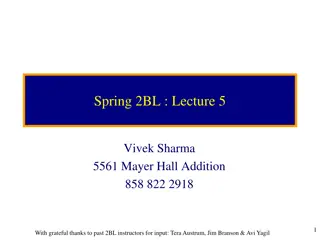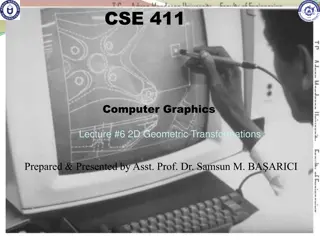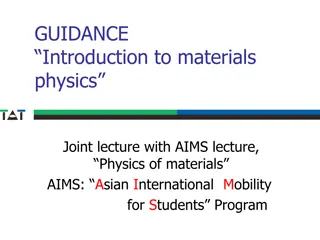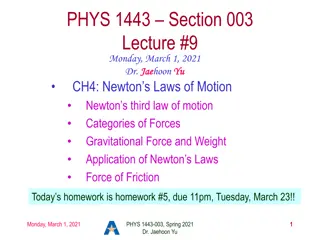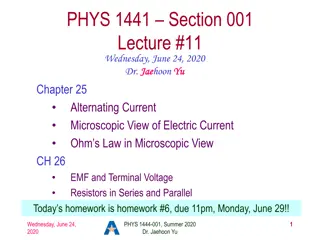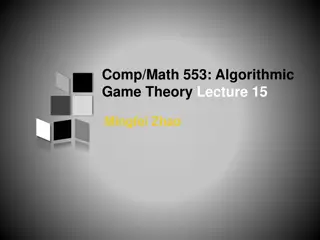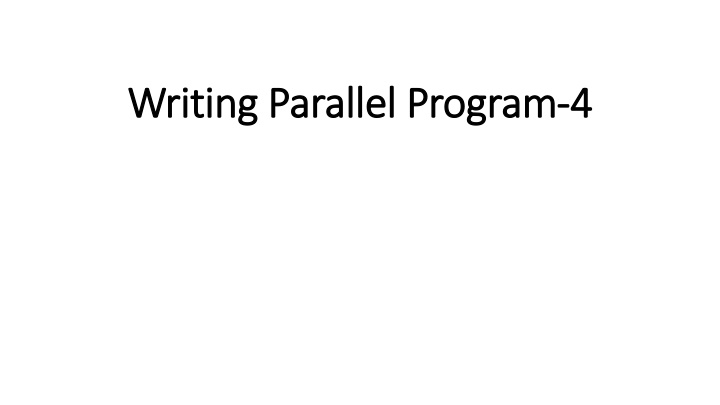
Parallel Programming Concepts
Explore key concepts in parallel programming such as synchronization, barriers, critical sections, data races, reductions, and parallel for loops. Learn about techniques to optimize performance and avoid common pitfalls in parallel processing.
Download Presentation

Please find below an Image/Link to download the presentation.
The content on the website is provided AS IS for your information and personal use only. It may not be sold, licensed, or shared on other websites without obtaining consent from the author. If you encounter any issues during the download, it is possible that the publisher has removed the file from their server.
You are allowed to download the files provided on this website for personal or commercial use, subject to the condition that they are used lawfully. All files are the property of their respective owners.
The content on the website is provided AS IS for your information and personal use only. It may not be sold, licensed, or shared on other websites without obtaining consent from the author.
E N D
Presentation Transcript
Writing Parallel Program Writing Parallel Program- -4 4
Recap Recap Synchronization (barrier, critical) Data race
Recap: Barrier Recap: Barrier A program point where all active threads will stop until all threads have arrived at that point. #pragma omp parallel { int i = omp_get_thread_num(); a[i] = i; #pragma omp barrier b[i] = i; } a b
Recap: Critical Section Recap: Critical Section Only one thread execute a critical section at a time. Provides mutual exclusion. Ref: https://ppc.cs.aalto.fi/ch3/
Recap: Data Race Recap: Data Race Multiple parallel threads access one shared memory location where at least one of these accesses is a write. The read or written value is undefined Example #pragma omp parallel for for(int i=0;i<N;i++) { sum = sum + f(a[i]); }
Reduction Reduction Reducing an expression to a value. sum = a[0] + a[1] + + a[N-1] Can we can reduce the following loop? Issues: for(int i=0;i<N;i++) { sum = sum + a[i]; } - Data race
Reduction Reduction Reducing an expression to a value. sum = a[0] + a[1] + + a[N-1] Can we can reduce the following loop? Issues: for(int i=0;i<N;i++) { sum = sum + a[i]; } - Data race - dependencies across iterations
Parallel For Reduction Parallel For Reduction Can we can reduce the following loop? #pragma omp parallel for shared(sum, a) reduction(+: sum) for(int i=0;i<N;i++) { sum = sum + a[i]; } Supported reduction operators: +, -, *, &, |, ^, &&, ||
Handling Parallel For Reduction Handling Parallel For Reduction #pragma omp parallel for shared(sum, a) reduction(+: sum) for(int i=0;i<N;i++) { sum = sum + a[i]; } Reduction forks a number of threads Iterations are assigned to threads Partial sum values are computed. Final value is computed by accumulating the partial sum values
When should we NOT parallelize a loop? Answer: If there are data dependencies across iterations Example: for(int i=0;i<N;i++) sum = sum + a[i]; The definition of `sum in iteration i is used in iteration (i+1)
Data Dependence: general Definition Data Dependence: general Definition There is a data dependence from statement S1 to statement S2 (statement S2 depends on statement S1) if and only if 1) both statements access the same memory location and at least one of them is a write and 2) there is a feasible run-time execution path from S1 to S2.
Data Dependency Data Dependency True dependence: writtendata is read later X = a; ; b = X; // X is not redefined between S1 and S2 Anti-dependence: read data is written later b = X; ; X = a; Output dependence: two statements write on the same location X=a; ; X=b;
Data Dependency Across Iterations in a Loop Data Dependency Across Iterations in a Loop Example 3: for(int i=0;i<N;i++){ t = a[i]; b[i] = t; a[i] = b[i]; } Example 1: for(int i=0;i<N;i++) sum = sum + a[i]; 1. t = a[i]; 2. b[i] = t; 3. a[i] = b[i]; Example 2: for(int i=0;i<N;i++) a[0] = i; 4. t = a[i+1]; 5. b[i+1] = t; 6. a[i+1] = b[i];
Data Dependency Across Iterations in a Loop Data Dependency Across Iterations in a Loop Read-Write: Data is written in one iteration and read in another iteration Example: for(int i=0;i<N;i++) sum = sum + a[i]; Write-Write: two iterations writing on the same location Example: for(int i=0;i<N;i++) a[0] = i;
Loop index based dependencies Loop index based dependencies Example 1: for(int i=0;i<N;i++) a[i+1] = a[i]; a[0] -> a[1] -> a[2] -> -> a[N-1]
Loop index based dependencies Loop index based dependencies Example 1: for(int i=0;i<N;i++) a[i+1] = a[i]; a[0] -> a[1] -> a[2] -> -> a[N-1] Example 2: for(int i=0;i<N;i++) a[i+2] = a[i]; a[0] -> a[2] -> a[4] -> a[1] -> a[3] -> a[5] ->
Loop index based dependencies Loop index based dependencies Example 1: for(int i=0;i<N;i++) a[i+1] = a[i]; a[0] -> a[1] -> a[2] -> -> a[N-1] Example 2: for(int i=0;i<N;i++) a[i+2] = a[i]; a[0] -> a[2] -> a[4] -> a[1] -> a[3] -> a[5] -> a[0] -> a[1] a[2] -> a[3] a[4] -> a[5] Example 3: for(int i=0;i<N;i+=2) a[i+1] = a[i];
Data Dependency Across Iterations in a Loop Data Dependency Across Iterations in a Loop Example 1: for(int i=0;i<N;i++) sum = sum + a[i]; Example 3: for(int i=0;i<N;i++){ int t = a[i]; b[i] = t; a[i] = b[i]; } Example 2: for(int i=0;i<N;i++) a[0] = i; Can we parallelize these loops?
References References OpenMP Specification. https://www.openmp.org/spec-html/5.0/openmp.html Chapter 2.2.1, 2.2.2 Optimizing compilers for modern architectures a dependence-based approach by Randy Allen, Ken Kennedy



